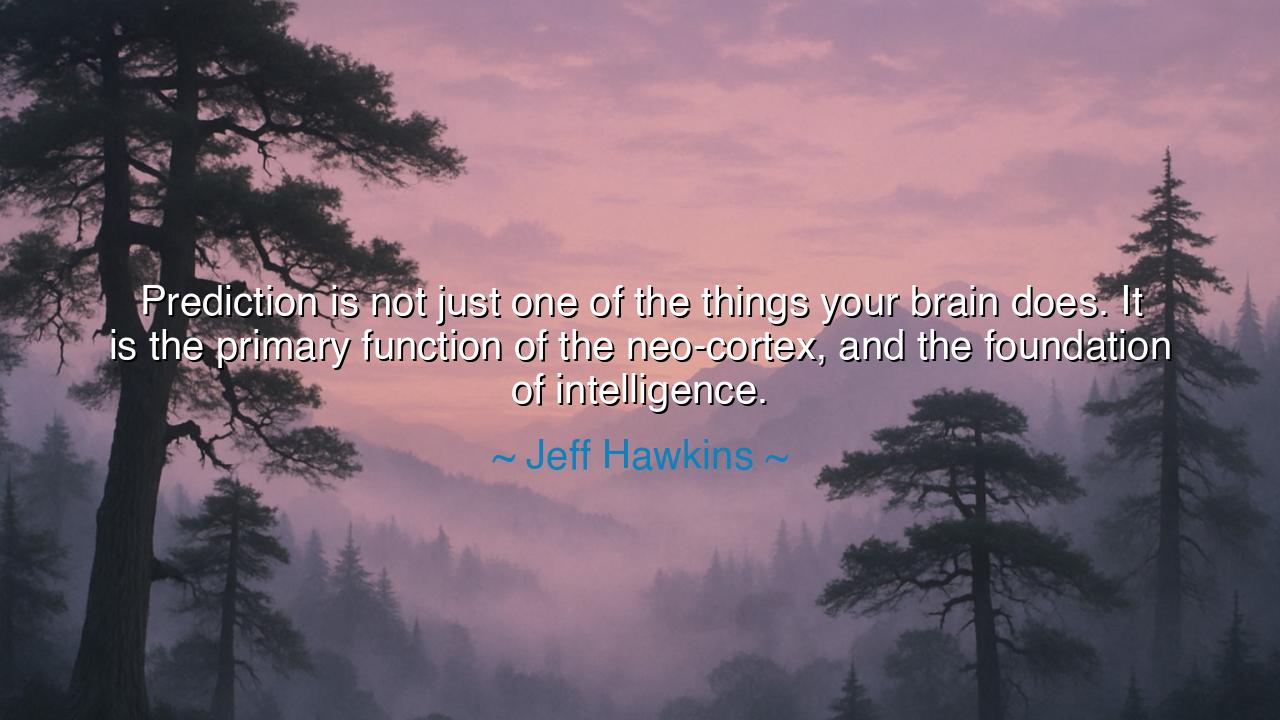
Prediction is not just one of the things your brain does. It is
Prediction is not just one of the things your brain does. It is the primary function of the neo-cortex, and the foundation of intelligence.






The words of Jeff Hawkins, pioneer of neuroscience and prophet of artificial intelligence, pierce to the very heart of human understanding: “Prediction is not just one of the things your brain does. It is the primary function of the neo-cortex, and the foundation of intelligence.” Though born from the realm of science, these words carry the weight of ancient wisdom. For what Hawkins reveals is not merely a truth about the mind—it is a truth about life itself: that to live, to think, to create, is to anticipate. The essence of intelligence is not reaction, but foresight—the sacred art of seeing beyond the moment, of shaping tomorrow before it arrives.
Jeff Hawkins, known for his revolutionary ideas on how the brain works, sought to unravel the mysteries of the neo-cortex—that vast, folded temple of thought which gives rise to memory, perception, and imagination. His insight came from studying not what the brain remembers, but what it expects. The neo-cortex, he discovered, is not a passive storehouse of facts, but a dynamic prophet—constantly predicting what comes next in every flicker of sensation, every movement, every thought. Whether you reach for a cup or listen to a voice, your brain is already guessing what it will feel, hear, and see. And when those predictions are wrong, it learns, reshapes, and grows. Thus, Hawkins unveiled the hidden rhythm of intelligence itself: that learning is born from the dance between expectation and surprise.
Yet this idea, though wrapped in modern science, echoes truths that ancient thinkers intuited long before. The philosophers of Greece and the mystics of the East all understood that awareness is not static—it is ever reaching forward. The Stoics taught that the wise man anticipates fortune and misfortune alike, preparing his soul for all outcomes. The Taoists spoke of harmony with the flow of change, foreseeing shifts in nature before they struck. And the strategists of old, like Sun Tzu, declared that victory belongs not to those who react quickly, but to those who predict the enemy’s move before it begins. Hawkins’s revelation is thus not new, but eternal: to foresee is to survive, and to understand the future is to master the present.
Consider the story of Alan Turing, the brilliant mind who, during the Second World War, helped decipher the German Enigma code. His genius did not lie merely in solving puzzles, but in understanding how to predict patterns of thought—how human intention weaves itself into systems of logic and error. In his work, as in Hawkins’s insight, intelligence was revealed not as mechanical computation, but as the art of anticipation. It was this same capacity for prediction that allowed Turing’s machine to pierce through chaos and reveal order—to save countless lives and change the fate of nations. Thus, the power to predict is not only the foundation of thought, but the engine of history itself.
Hawkins’s words also carry a mirror for the human spirit. For just as the brain predicts the world around it, so too must the soul learn to envision its destiny. Those who live without foresight drift like leaves in the current, reacting to each wave as it comes. But those who cultivate the power of anticipation—the artists, the leaders, the dreamers—become the architects of their own fate. To predict is not to claim certainty, but to engage with possibility. It is to see in every moment the seeds of what may yet be, and to shape those seeds with intention. Thus, intelligence is not only the function of the brain—it is the discipline of the heart, the courage to imagine what has not yet come.
And yet, Hawkins’s insight bears a warning as well. For the same power that allows prediction can also enslave it. When the mind becomes too rigid in its expectations, it ceases to learn; when it clings to its forecasts, it blinds itself to new truths. This, too, is part of the human condition. Empires have fallen because their leaders could not see beyond the patterns of their own triumphs. The Roman Empire, mighty and confident, believed its borders eternal—yet it failed to predict the decay within, the slow unraveling of loyalty and culture. Intelligence, therefore, must remain humble. True foresight does not mean control over the future, but harmony with it—the ability to adjust when prediction falters, and to grow when surprise arrives.
Therefore, O listener and seeker of wisdom, let this teaching take root within you: to live intelligently is to live prophetically. Do not move blindly through the world, but cultivate awareness of patterns—within yourself, in others, and in the great tides of life. Ask not only, “What is happening now?” but also, “What is about to happen, and why?” Train your mind as Hawkins describes, to anticipate with curiosity, to adapt with grace, and to learn from every unexpected turn.
For in the end, intelligence is not the memorization of what has been, but the comprehension of what may yet be. To predict is to participate in the unfolding of the universe, to join creation itself in its eternal act of becoming. This is the foundation of wisdom, the gift of the neo-cortex, and the legacy of every mind that dares to think ahead. And when you master this art, as the ancients and the scientists alike have urged, you will not merely survive the future—you will shape it, and in shaping it, become one with the infinite intelligence that moves through all things.






AAdministratorAdministrator
Welcome, honored guests. Please leave a comment, we will respond soon